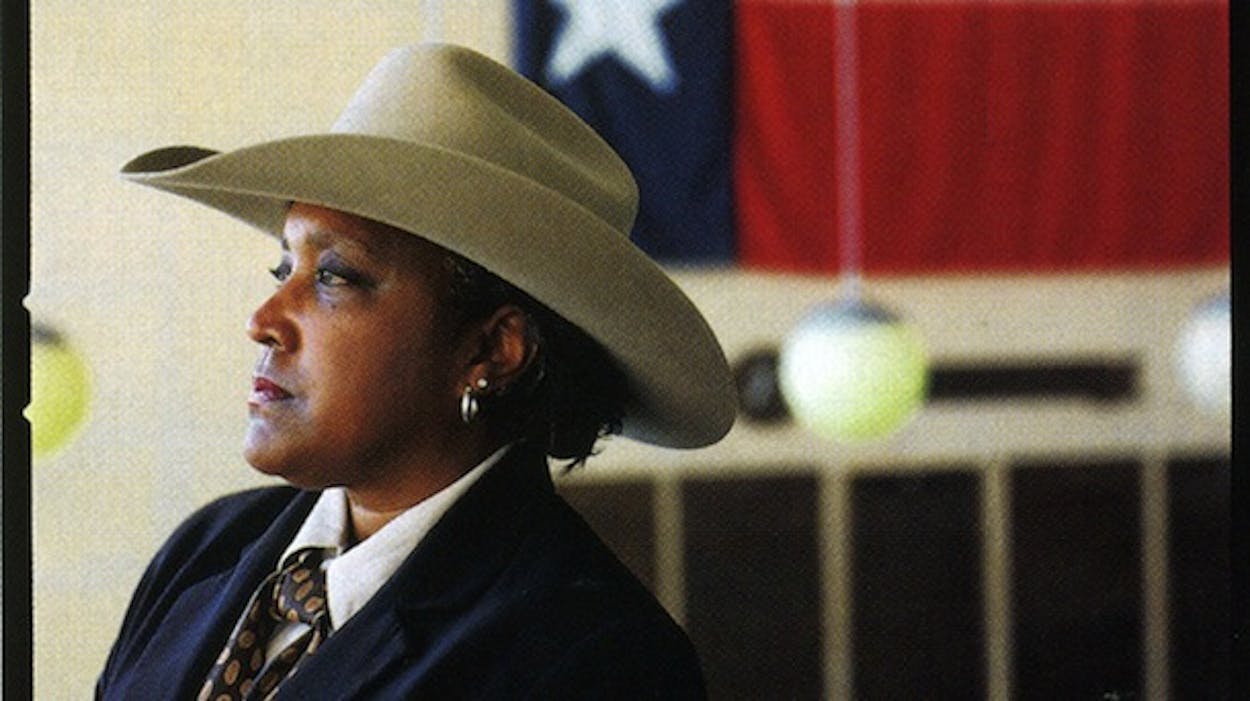I’ve spent almost my entire career being one of the only women in my profession. First it was being in the Army Reserves after I finished college in the seventies, then it was being the third woman overall, and the first African American, to become a Texas Ranger. It got to the point where at work I just realized that I would never be completely accepted as one of the guys but that I wasn’t really one of the girls either. Sometimes I was somewhere in between.
My father was in the military in South Carolina when I was born, but we moved around a lot. Eventually we settled in Abilene when I was in junior high school. I was in the ROTC during college, and then I joined the Reserves after I graduated. They sent me to the 6th Cavalry Division at Fort Hood as an officer as a sort of experiment. There were lots of compromises that had to be made for women back then. Some were little things as simple as finding bathroom facilities. At one point I had to use the commanding officer’s bathroom because there was nothing else there. He wasn’t happy about it, but he also saw that I wasn’t going away. And when we’d go out into the field for drills, the other three women and I had to sleep in the back of a pickup truck while the men all slept in tents. For some reason they didn’t want us to sleep in a tent together. I never really understood that. I’m not sure what they thought we were going to try to do. In 1984 I joined the Texas Department of Public Safety, but I didn’t always want to be a Ranger. I’m kind of an anomaly here because I didn’t even take Texas history when I was in school. Growing up, I didn’t really know there were Texas Rangers or about the tradition. But while I was working as a DPS recruiter, I would hear people talking about them, and I became interested. When they started accepting women, in 1993, one of my bosses encouraged me. I wasn’t sure if I wanted to go through that again. But I always put everything in God’s hands. I prayed and prayed. Eventually God decided he didn’t really want me to go into polygraph testing. He wanted me to be a Ranger.
When I joined, they were definitely used to being an all-male organization. Some of the accommodations that were made for me were kind of funny. Rangers don’t wear real uniforms; they dress in Western wear, and at the time, the men all wore these poly-knit pants. I just didn’t think I could be seen around town in poly-knit pants, you know what I mean? So I just sort of begged and begged, and I think they understood. I never had to wear those pants.
When I would show up on a call, a lot of people weren’t ready to see a Ranger who looked like me. I think it’s just a mentality that they are, and always will be, an all-male organization. We share our office in Waco with the Ranger museum, and people come and see the picture on the wall of all of us. I’m right there with the rest of the Rangers, with my jacket and hat. People point to me and ask, “Is she a real Texas Ranger?” But it’s changing. When I joined, there were only three women—and now that I’ve retired there’s only one—but women are moving up through the DPS ranks. We have a woman division chief and lots more women troopers. I used to know them all by name, but there are too many now.
I think having women Rangers is important because we bring a different perspective. We think about cases differently; there is such a thing as women’s intuition. And sometimes people are just uncomfortable talking to a man or vice versa. One time we were working on a young man’s capital punishment case. He was found guilty, but he didn’t get the death penalty. His mother called me a few months later because she needed help, something to do with his sentence. I said, “Don’t you know who I am? I was the one investigating your son.” She said, “I know, but that doesn’t mean you can’t help me now.” I thought that was a great example of what Rangers represent. If you do your job right and you work in a professional and unbiased way, people will respect what you do. And when people really need your help, they won’t turn you down, no matter what you look like.
–Christine Nix







